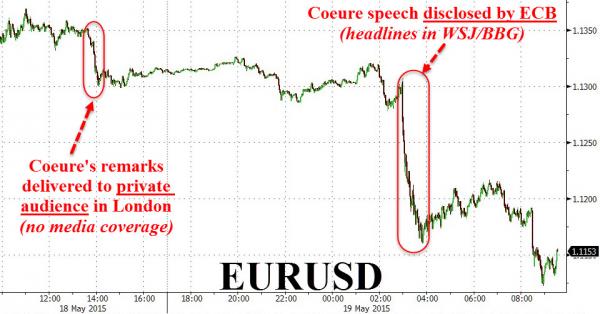On May 18, 2015, the ECB’s Benoit Coeure held a closed-door speech under “Chatham House” rules in which he leaked to an audience of hedge funds in London that “the central bank would moderately front-load its purchases in its quantitative easing program because of the seasonal lack of market liquidity in the summer.” The reaction was an instant 50 pips drop in EURUSD as one or more funds decided to ignore the “rules”, and promptly traded on the material, market moving leak.
The problem for the ECB is that it had just disclosed material, non-public, inside information to a group of market professionals fully aware they would trade on the news. It wasn’t released to the trading public until around 8am the next day (London time) when it resulted in a further 150 pip plunge. This, for lack of a better word, was criminal.

As egregious as this obviously was, it didn’t surprise us or anyone else familiar with the relationship between policymakers and those who essentially gamble on policy decisions, aka the commercial banks who own the central banks. Indeed, it was simply another example of nefarious intermingling between central planners and a select group of private sector operators and came just as Jeb Hensarling began to turn up the heat on Janet Yellen regarding leaked Fed data (an investigation that has gone precisely nowhere).
To be sure, once caught leaking market moving data to a select group of billionaires, just a few days later the ECB blamed the fiasco on an “internal procedural error” and promised such behind the scenes meetings with hedge funds profiting from ECB leaks would not happen again.
It happened just a few months later when as the May 18, 2015″some of the European Central Bank’s top decision-makers met banks and asset managers days before major policy decisions, and on one occasion just hours before, copies of their diaries reveal.”
The diaries show two members of the ECB’s executive board, Benoît Cœuré and Yves Mersch, met UBS bank the day before a two-day policy meeting of the central bank’s rate-setting governing council on September 3 and 4 2014. Mr Cœuré also met BNP Paribas bank on the morning of September 4, the day the ECB’s governing council surprised markets by cutting interest rates. It also announced it would begin buying private sector assets to save the eurozone’s economy from the threat of deflation. UBS and BNP Paribas declined to comment.











Leave A Comment